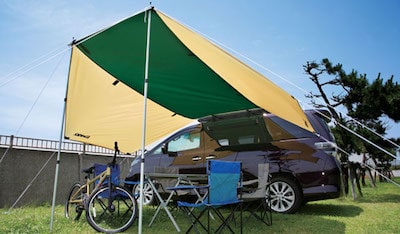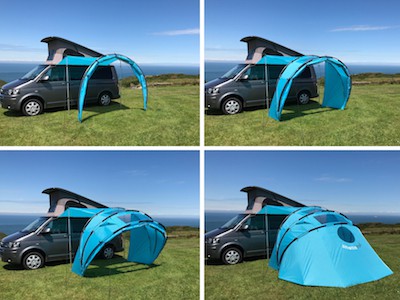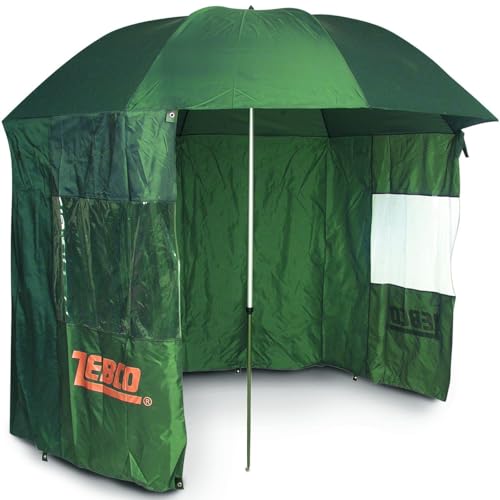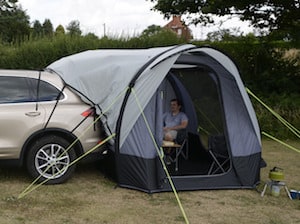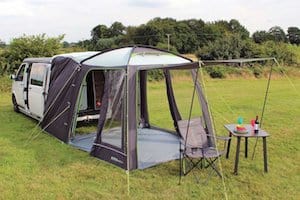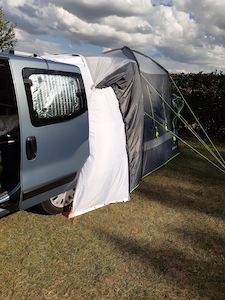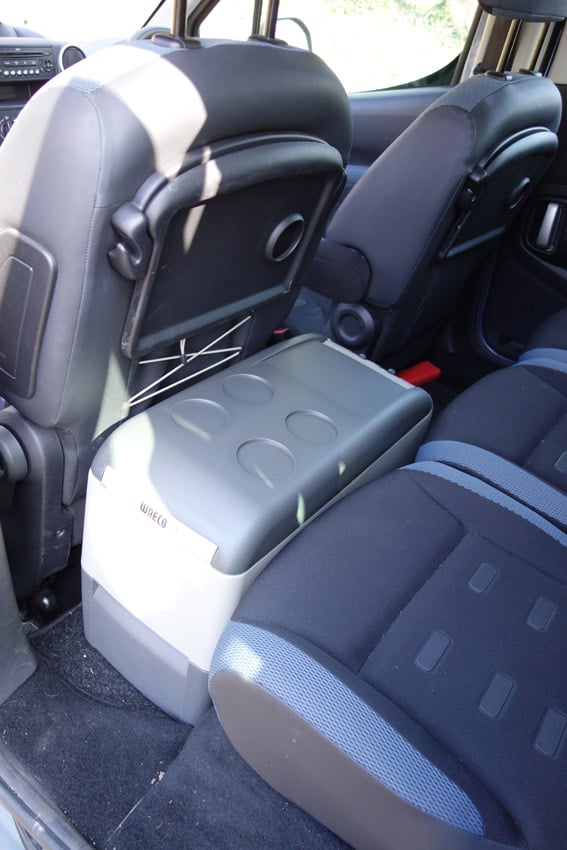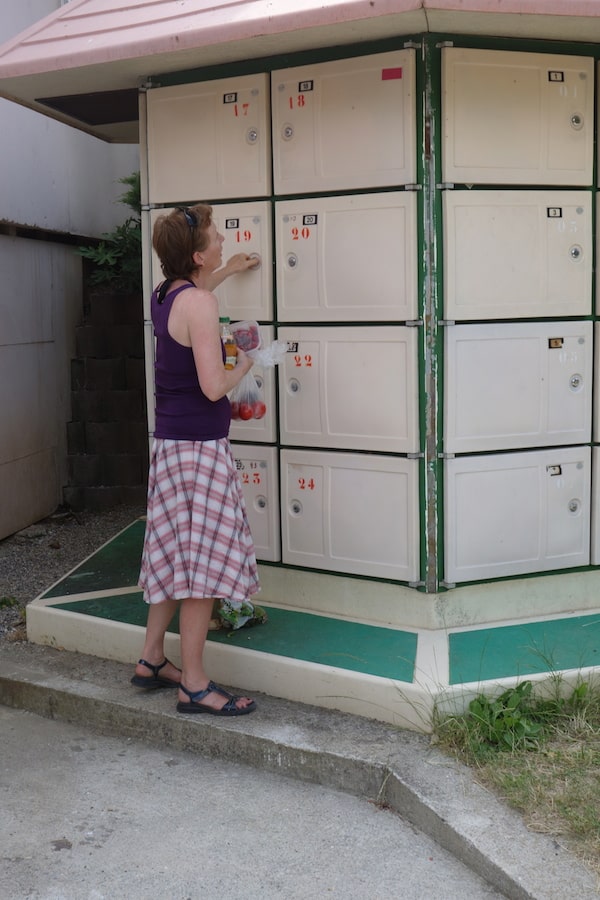Stealth camping, car camping, makeshift campervanning…call it what you will, there’s huge interest in keeping camping simple, cheap and spontaneous.
So, follow our guide to turning your car (or small van) into a part-time camper and start exploring!
All our reviews at Campfire Magazine are independent and honest.
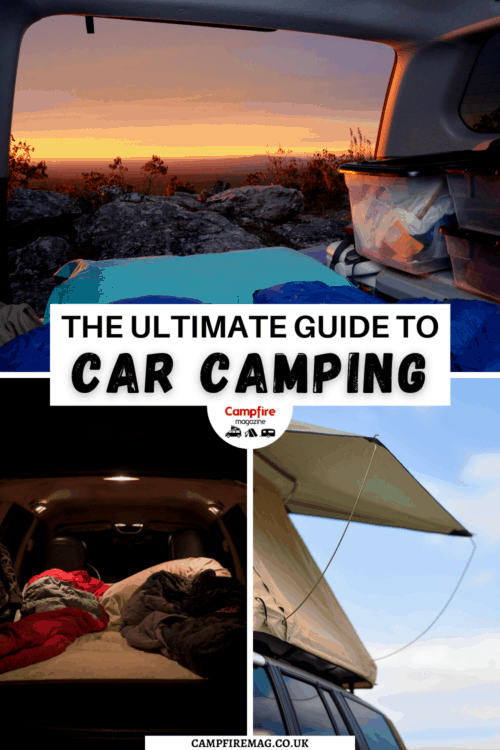
In a hurry? If you don’t have much time using the links below to quickly find our favourite must haves for car camping. You can be assured we only choose the best products…
Why camp in a car?
It’s cheap
At its most basic, a duvet or sleeping bag, your own supply of water and a simple portable toilet is all you need. You won’t be all that comfy, but it’s fine for a night or two.
Make a few affordable additions to your kit, though, and you’ll have a mini campervan for not much money.
It gives you freedom
Let’s camp…just over there.
When your car can become a tiny campervan at the drop of a hat, you’re free to set off and explore. Here is a gorgeous place we found in Devon.

You can stealth camp
No-one notices a car (unless you’ve kitted it out with fairylights, of course). You can park up almost anywhere (more on that later) or disappear into remote spots for some wild camping .
But…It goes without saying that your freedom shouldn’t impinge on anyone else’s – so respect the areas you camp in and the people who live there.
It’s multi-functional
It’s your go-to-work car during the week; at weekends, it’s your funmobile (did I really write that word!).
Why have an expensive, rarely used campervan or motorhome on the driveway when you can convert your car in the twinkling of an eye?
It’s an adventure
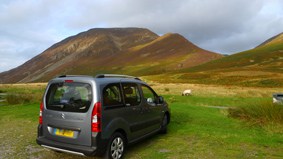
Fancy waking up to this view?
Find yourself in new places, be amazed at how well you can manage on very little, enjoy the satisfaction of designing your own space. Some bluebell woods we found too.
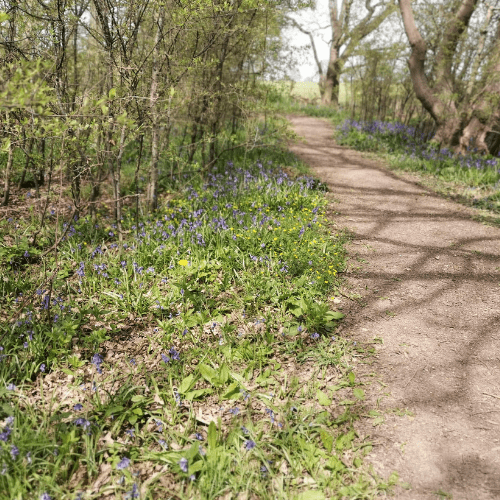
But…here’s why you SHOULDN’T camp in a car
You might not want to squeeze a family of four and a Great Dane into your Ford Fiesta.

In fact, if you have a very small car, you might struggle. Having said that, we know of people who’ve had a good night’s sleep and woken up to views of lochs and mountains through the windows of a Renault Clio. Almost anything’s possible with a little ingenuity.
Sleeping in your car in comfort
Backseat beds and more
Get it right and sleeping in your car or van can be a lot more comfortable than in a tent. You’re protected from the wind and rain, it’s more soundproofed and you’re off the ground.
The ideal is a car with removable backseats and a more-or-less flat floor. Read how we did that in a Berlingo.
Cars with big hatchbacks are much more suited to camping than those with a basic boot. Even in a ‘normal’ car, though, a backseat bed like those below can be the answer. Prices are between £20 (for the one that simply fills the gap in the rear footwell) to £90+ for a full and comfy mattress.
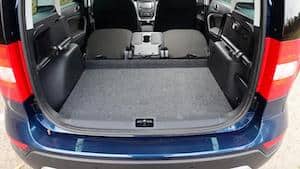
Here’s a Skoda Yeti with the seats folded. They come out too. Why oh why did Skoda stop making this car?
In a car or van where you can empty out the back (or fold the seats flat), you have lots of options for sleeping – from the storage box method described in our article on Berlingo camping to building a basic bed base, to simply rolling out a standard sleeping mattress on the floor.
So let's dive in and take a look at what are the best option for turning your car into the perfect funmobile!
Multi-use Backseat Bed
This airbed can work on the backseat or lengthwise into the boot with seats folded. It comes with a pump, pillows and a section to hold up the bed in the rear footwell. It also comes in a selection of colours! Some people have found it a little on the small size so do check the dimensions will work for you.
Size - 137 x 88 x 40 cm
Weight - 500 Grams
Capacity - 300KG
Boot Backseat Bed
A more expensive mattress for the boot of the car, but it has side bumpers to cover the wheel-arches. Comes with an electric pump and a repair kit. This one is a little bigger than the other so may be more suitable for 2 people to sleep on but again check the size fits your boot.
It comes with a 12V pump and stows away to just 25 x 22 x 10cm.
Size when inflated - 180cm x 128cm x 12cm
Weight 3.08 Kg
Capacity - 300kg
Self Inflating Car Mattress
This boot mattress has two advantages – it’s self-inflating (though you might need to top it up with a bit of breath) and the fabric is more comfortable than some. You will need to inflate the pillows yourself however, comes with a bag for storage and is fairly light to carry.
You can fold it lengthways for a rather sumptuous mattress for one, or roll it out for a fully wide bed. Packs small.
Size when inflated - 180 x 132 x 5cm
Weight - 2.78kg
Comes in a choice of colours
Bridge the footwell gap
With this inflatable cushion, you can bridge the gap in the rear footwell and use a standard mattress to sleep on. Easy to inflate and put down when not using it and a compact option.
You’ll need a good thick mattress to even out the bumps. Have a look at our favourites in our camping mats guide.
Of course you don't have to opt for a car air mattress that is specifically made for a car you can look at our camping mats article and see if any of them would fit the bill or our camping mattresses for couples. Just make sure you check the sizes with your car boot and consider how close you might end up to the ceiling of the car should you go for luxury thickness.
The Best Camping Mats
7 Best Camping Mattress For Couples
A bed base made of storage boxes
If you have a car (or van) with a more-or-less flat floor in the back, then the storage box option is fantastic.
The boxes give you space for all your stuff and form a base for your mattress. It’s easy to turn your car-camper back to car when you need to carry passengers.
Ikea boxes are good, though test for sturdiness. For ultimate strength and the biggest range of sizes, 64-litre Really Useful Boxes are what we’ve used…really useful. The 84-litre boxes are also perfect in the Berlingo.
Make sure they’re see-through so you’re not hunting for lost gear.
Four storage boxes with air mattresses on top. Very comfy too.
Duvets and mattresses
There’s no need for sleeping bags. A duvet will keep you warm and let you move around more.
We do like sleeping bag hybrids, though, because they give you lots of options.
A bargain for warmth, this cosy bag comes as a double or single. The double can be turned into two single bags. Both work as a flat duvet.
There are some other hybrids in our sleeping bag guide, by the way.
Sleeping pods
We’ve also come across sleeping pods recently and these could be lovely in your car-camper. This Active Era is superwarm. The Highlander pod is slightly cheaper and cosy too.
Other fancy options
We also came across the Sportneer Sleeping Bag which we love because it has little holes you can pop your hands through and a zip at the bottom so you can pop your feet out so you can navigate and sort a few things in the car or out I guess without leaving the warmth of your sleeping bag. Got to love this one!
Lastly these chargeable heated sleeping bags could be a great choice as it can get pretty cold in the middle of the night in the back of a car. These are great but you would need to get a power bank charger to plug it into. It has different setting from low to high.
Self-inflating mats
Because your floor will no doubt have a few lumps and bumps, go for a decent mattress that will even things out.
During the day, you can let a bit of air out and fold it up to make a chair.
Our favourites are the Klymit Static V Luxe, but for more softness, go for something like the Vango Comfort, which is a good balance at 10cm thick and under £60. I’d choose single rather than double for ease of storage and versatility.
Reader Tomazs told us that the usual double mattresses wouldn’t fit in his Honda, so he recommends the 120cm Decathlon airbed. A perfect fit.
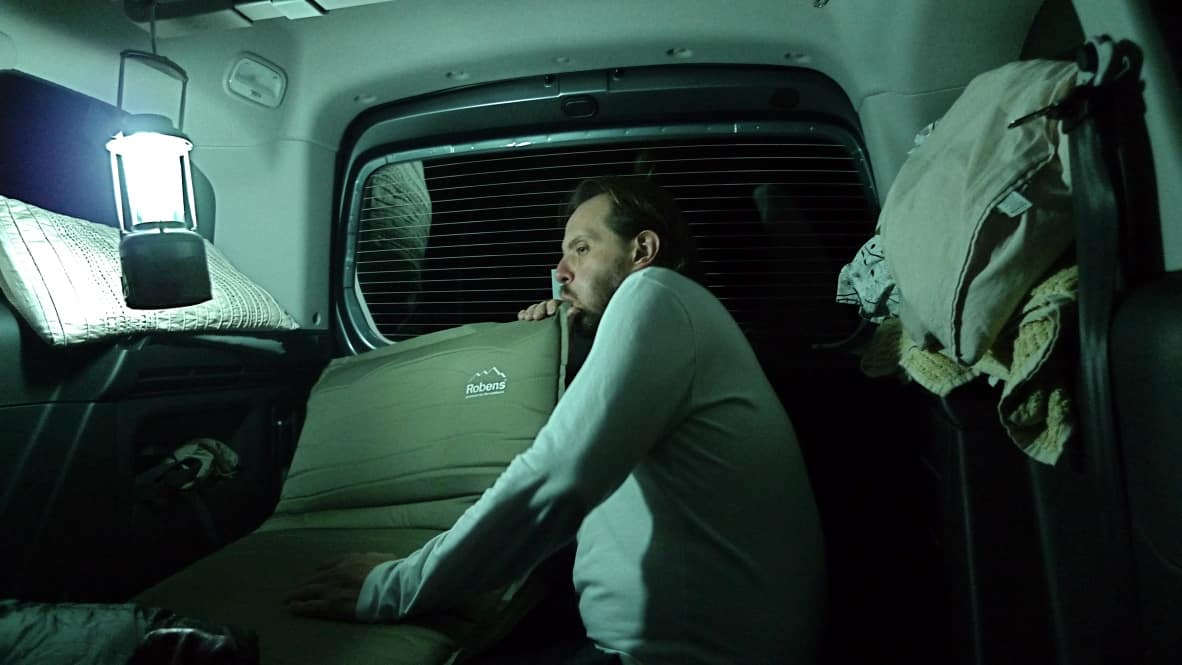
Blowing up an airbed in a car isn’t our favourite camping job. Go for self-inflating if you can.
Lots more comfy camping mats in our guide too.
Good All round Mat
For comfort, the best choice from the Klymit range is the Static V Luxe. There’s also an expensive Static V insulated version. They’re super light and the V-shaped baffles keep air in place for a more restful sleep. These are around 7.5cm deep. They’re not self-inflating, but the company promise it’ll take just 10-20 breaths!
There are lighter weight and double versions available too. Best of all? No crinkly crunchy noise when you roll over!
- Size: 193cm x 76cm
- Packed size: 14cm x 25cm
- Weight: 992g (non-insulated)
Mattress Toppers
A mattress topper is another option, but check you can fold it up, as some can be bulky. We’ve had a couple of readers recommend a Latex Plus By Yanis 5cm Dunlop Latex Mattress Topper to us. It’s little more expensive but has the advantage of a cover. There are plenty of sizes to choose from (10 in total!). There are also some unbranded memory mattresses that you could then cover with a sheet.
Pillows
Get yourself a couple of packable, but super-comfy memory foam travel pillows. Gorgeous – especially our favourite breathable bamboo-cover ones.
You could also look at this compact camping pillow with removable cover.
Going to the loo
If you’re on a campsite (and remember that not all campsites will allow car camping, see below) then you’ll obviously have showers and toilets.
If you’re wild camping (or stealth camping), you’ll need to prepare.
Going to the toilet in the wild requires some work – you need to be 50 metres away from water and you need to dig a 15cm-deep (or more) hole with a trowel. You must cover your doings completely with earth and must put toilet roll or wipes into your rubbish bag.
It’s better to take your own loo that you can empty when you get back to civilisation. The simplest option is a bucket with a well-fitting lid (put some water and eco toilet fluid in it).
If that’s not enough for you, have a look at our article on the the best options for camping toilets (including some that fit in a pocket!).
The Smallest "proper" Camping Toilet
The Thetford Porta Potti Qube has a pump flush and a waste collecting tank at the bottom that you can empty in a loo. The smallest Thetford (the 335) is a neat little loo with a 10l capacity. H31.3 x W34.2 x D38.2cm
We also like the Dometic 972 portable toilet, still very compact.
Hygiene
We never mention toilets without a mention of the Happy Going – our long-time favourite bit of kit…because it’s both useful and hilarious. It’s a waterproof, hanging toilet roll cover with built-in lights (and a flashing mode!!)
For a couple of days, biodegradable and all-natural Aqua Wipes or Nilaqua waterless wash will be enough for a makeshift clean-up. We actually make our own wet wipes to avoid waste and more plastic. Remember that biodegradable doesn’t mean it can be chucked in a hedge because it stays as litter for a long time. Take wet wipes and paper home with you.
Water supplies
Take a portable water carrier like the two-litre Source Liquitainer or new favourite, the Sea-to-Summit 10-litre Packtap and refill whenever you get the chance.
For longer trips, intersperse campsite stays or use the facilities in pubs, leisure centres and the like.
On our last trip, we ran out of water and had to refill from a VERY clean-looking river. We did have some water purifying tablets in our kit too, though.
We have lots of other recommended water storage and dispensing options in our water carrying feature too. All BPA-free.
In a four- or 10-litre option, this is a perfectly flat water container with a one-hand operated tap. The inside bladders are mylar (the stuff they make wine bladders out of) and the outside is rip-top nylon, so it’s durable and won’t taint your water.
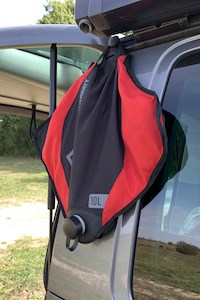
Showers? Really?
There are a few portable showers out there, and some homemade options, but you’d need to be somewhere quite warm to make these bearable.
The trickle you get from many is just not worth the bother, but we do like this pumped shower (in action here on a cold car camping trip).
We’ve tested them all and the Colapz camping shower is brilliant. Fill a bucket with warm water from your kettle, drop the pump inside and get a decent shower with real pressure! Great for washing dogs too.
Our current favourite camping shower is the Colapz (of collapsible bucket and watering can fame).
The good Colapz guys have developed a portable pump shower that recharges by USB. Looks smart and neat (and is inexpensive even when including a collapsible bucket).
The pressure is surprisingly good and it’s easy to use. You can use the Colapz bucket, the Colapz utility bags or any standing water (bucket, lake or whatever).
Cold weather and heating
If you’re planning on camping in cold weather, take thermos flasks (we like Isosteel best) of hot water for quick cuppas and to fill hot water bottles.
Layer clothes and don’t wait to get cold before you add layers or get under the duvet…it’s harder to warm up again.
Find a nearby pub with a log fire and, if you’re somewhere private where the noise won’t annoy anyone, start the engine to warm up the car just before you get into bed.
We like these seat heaters! Simon (who wrote to us) swears by his 70W Silentnight Comfort Control electric blanket running on a decent 200W powerbank.
Read our article on cold weather camping and our guide to campervan heaters.
Lighting your car-camper
The best kind of camping lighting we’ve found is LED and can be recharged (or left running) from a USB adaptor in the 12V socket.
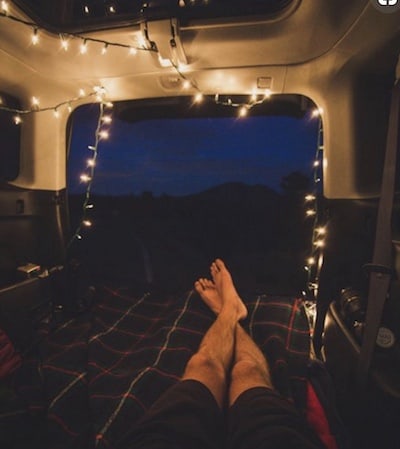
There are lots of options to choose from – from fairylights that will give you atmosphere to bright reading lights.
We’ve been using the Luminoodle recently – it’s a light rope that folds into its bag to create a lantern. It’s bright, has magnets and clips to fix anywhere and is really versatile.
We also like this foldable lamp, which we use at home as well as on the road. It has three brightness settings and is touch sensitive, all in a neat, adjustable package for around a fiver.
For both illumination and phone charging in a lightweight package, try the Luci Base Lamp. Brightness options and you can hang it or even float it in a river!
We have an article on Rechargeable lanterns too which can be handy for hanging up.
Fantastic Luminoodle – an LED light strip (different lengths available) with rechargeable powerbank and clever hanging options.
Bright enough to read and cook by too. Plus they come with a semi-transparent bag to make a sort of table lamp. Clever.
Foldable Lamp
Luca Base Light Inflatable
Portable Power
When wild camping or sites without power having a power source for some people is an absolute must enabling you to charge your phone and other devices and sometimes to power small fans or heaters as needed. Here is one of our favourites.
The Anker PowerHouse 757 like the ll is a great portable power bank, the side torch feature and ambient light at the back will light up a camper or tent easily is a really good addition, it is super easy to use and has a really clear LED display so you can see what power you have left. It hold sits charge for a REALLY long time and charges to full power in just a few hours.
See our Camping Must Haves article where this is featured.
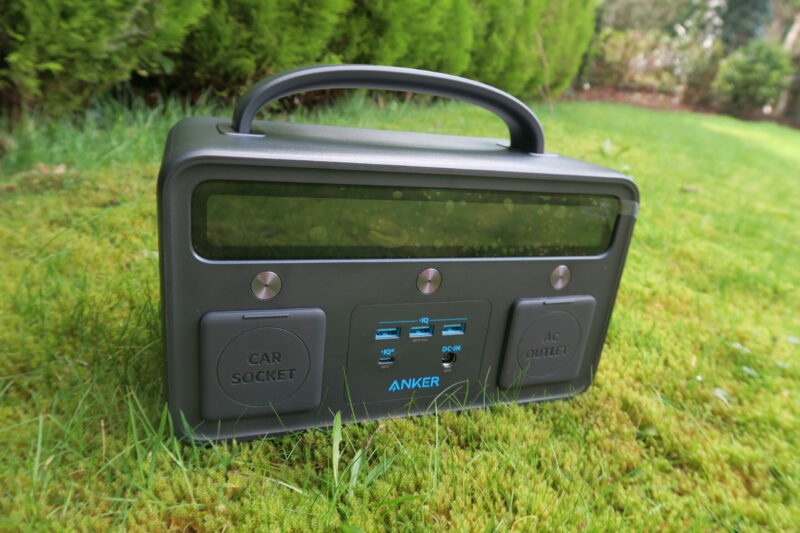
Privacy and darkness
If you don’t want to be woken at dawn, you’ll need to create some dark (and privacy).
Those cheap folding silver sunshades work well on the front and back windscreens, and some come in packs with side blinds too, like the ones below.
If you have a 2008-2017 Berlingo, you can get a VERY smart but expensive eight-piece set of thermal blinds that will fit perfectly.
You can make yourself some blackout blinds or curtains for side windows using fabric and suction pads. If you have a small unlined van or car doors with metal surrounds, magnets can work too.
Thanks to Dave Gray for his suggestion of using tailored sunshades with a cut-out sheet of Proplex or Correx held behind for total darkness.
You could try some sun shades, like these ones below.
Eye masks and earplugs take up no space and will give you a more peaceful night!
Ventilation and pests
Condensation
If you seal yourself up snuggly in your car, you’ll find a lot of condensation in the morning.
If you have a sunroof, open it up a little. You can make a mosquito/fly screen with a bit of mesh fabric and some magnets if you’re worried about insects getting in.
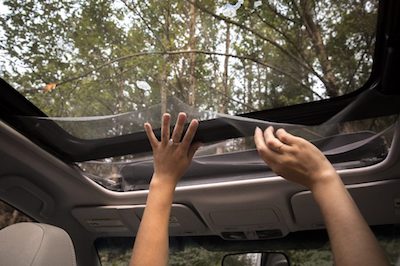
Insect-proofing
No sunroof? Leave a window open a bit. Here’s a great tip for insect screening when it’s hot – make a pillowslip of netting with the slit on the long side. Slip it over the open door so that it covers the window. You’ll still be able to close the door, but you can also open the window for air.
There are readymade versions of these ‘sunsock’ window covers too.
If you’re in a secure spot and the weather’s good, you can also fix a standard mosquito net over the open hatchback.
A Note On Shoes!
When you’re living in a small space, and especially in bad weather, it can be hard to keep everything clean and dry.
Have some easy-on/off footwear like our new favourites (Toffeln clogs) or these cheap neoprene Dirt Boot shoes (3-12 sizes). Leave muddy boots and shoes in the driver or passenger footwell.
We’ve been recommending the Dirt Boot shoes for all that in-and-out of tents and vans (see further down), but we’ve just discovered the Toffeln range of professional quality clogs and shoes. Brilliant!
Dirt Boot Neoprene
The smallest car camper so far?
Chris sent us this photo of his Seat Marbella car camper. What do you think?
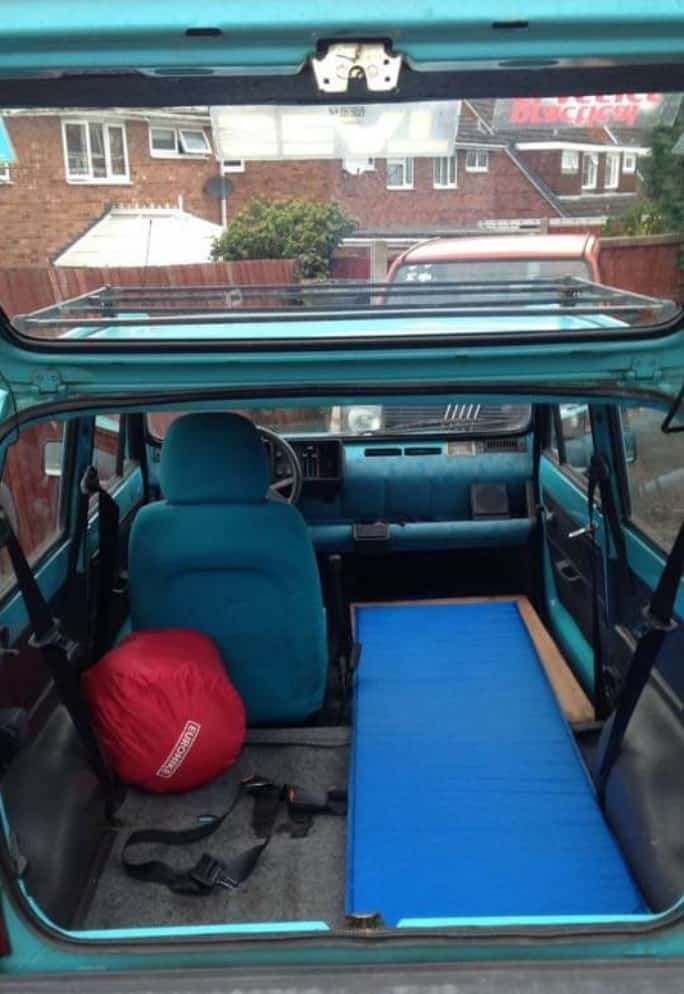
Creating car camping space – storage, awnings and more
For quick and stealthy trips, you really won’t want to make yourself obvious with anything outside the car or van. In these cases, being well-organised inside is key.
It takes trial and error to discover how best to pack (and what to leave out), but it’s an interesting challenge. We’re always changing how we do things as we learn more and it’s fun to find a more efficient bit of kit or way of doing something. Hunting for just the right size storage box that’ll fit between the seats, maybe, or stick-on hooks for the ceiling.
If you need more? Well…try a couple of nights and see whether simplicity trumps luxury! Also, remember to check out our guide to Urban Stealth Camping
Hanging toilet bags (we like the Reisenthel bags best)…
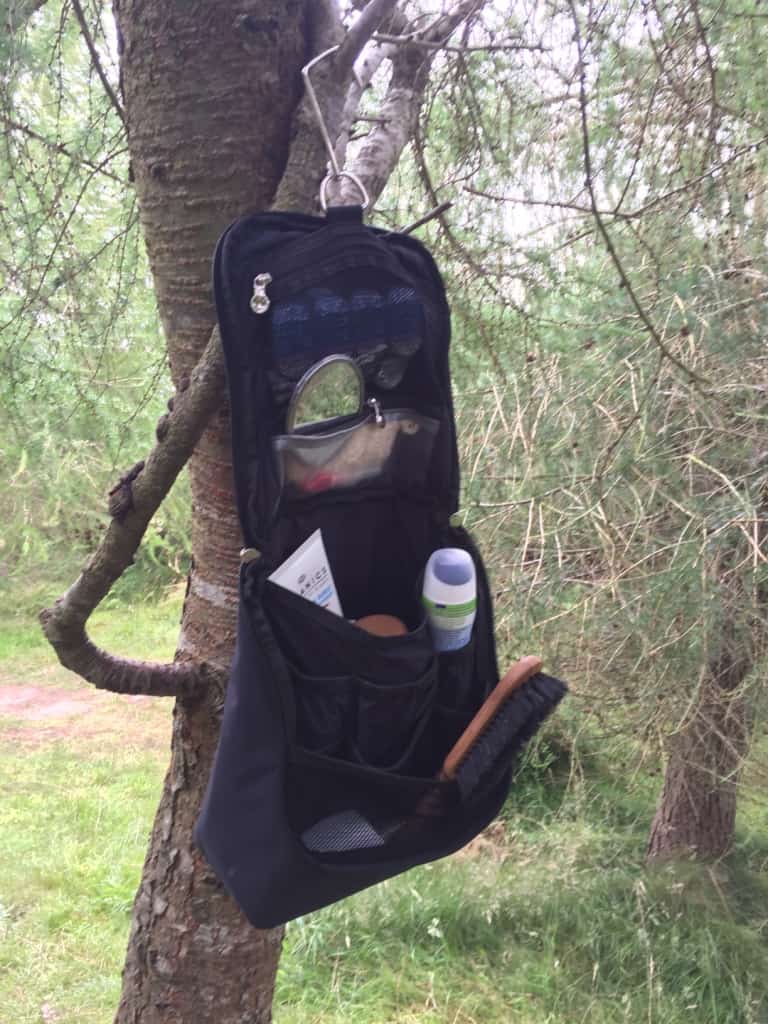
This storage net simply velcros onto a carpeted wall. Two in a pack for less than a tenner too.
Shoe organisers and storage nets that can be strung up for easy access to often-needed kit.
This backseat organiser can hold a LOT.
There are some good seatback organisers that hang over the front seats (some even with minitables). Ikea is a wonderland of storage ideas too.
These hangable bags can take your rubbish, a water bottle or any odds and ends.
Tarps, awnings and shelters
If you’re on a campsite or in a private spot for a few days or more, then it’s time to extend outwards!
Here’s where a simple tarp can become a rain shelter, an outside dining room, a camp kitchen or a sunshade. Fix it from the boot or the side doors, suspend it from nearby trees (and don’t forget to use elasticated bungee cord to save your tarp in a wind!).
We love the versatility of a tarp and you can read more in our tarp article.
Awnings give space…and take up room
An awning is another option, but the problem here is that, when they’re folded away, they take up too much room inside your already limited space. If you’re going somewhere where you know you’ll spend most of your time outside, then have a look at our recommendations for small and lightweight awnings.
The bivvy option
It’s good to have options. So, we always take a couple of bivvy tents or hammocks with us. These pack away to nothing and mean we can head off into the trees or stretch out on the ground if the place is right and the weather amenable.
Our favourite is the AquaQuest West Coast, but plenty more recommendations here.
Fishing umbrellas for shelter?
One of our readers told us they used a fishing brolly instead of a tarp. It’s a great tip.
We like the Zebco storm brolly as it’s very tall (with side panels too)
Truck tents
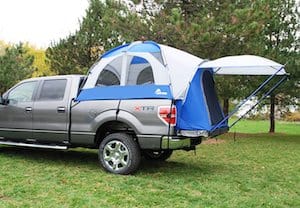
If you have a flatpack or pick-up, how about one of these truck tents…
Utility tents for versatility
We love this Snewvie pop-up that could make a simple awning or porch. Very versatile.
Our preference would be a pop-up utility tent with a porch that can be fixed to the side of the car with magnets or rope.
Lots to see in our guide to multipurpose shelters.
Lumaland instant gazebo with optional sides
A smart, surprisingly sturdy and affordable option.
The Lumaland gazebo comes with one side wall and you can buy the others separately as needed.
Comes in a minimal black, a vibrant lime and a rather nice blue. It takes less than 30 seconds to set it up or take it down. It’s waterproof and includes a bag and pegs.
- Floor size: 250 x 250cm
- Height: 190cm
- Pack size: 120 x 14cm
- Weight: 5.9kg
Tailgate awnings
There are few decent tailgate tents out there for small campervans and cars. Air versions tend to be more expensive (and heavier) than poled tailgate tents.
Kampa make a Tailgater in either a poled or an air version.
Outdoor Revolution has a few models, but they’re big! Have a look at the Movelite Tailgater and the Momentum Cayman.
Skandika make a great tailgate tent for SUVs, vans or car-campers. We love the lovely big windows and standalone/driveaway ability.
This has the advantage of working perfectly alongside a van or car, or as a standalone utility tent. Plus, it’s affordable.
- Floor size: 200 x 200 cm
- Height: 180-240cm (van height)
- Weight: 5.6kg
- Pack size: 67 x 46 x 44cm
Jane S. asked us whether this one would be OK for the tailgate of her Fiat Qubo. With a bit of creativity, it certainly did the job.
She says: “I made a narrow extension piece from a shower curtain to completely enclose the hinge part. I was lucky with the weather so am not sure if this would have been 100% watertight! I had some sticky magnetic strips that I stapled on to give extra strength. Just over the top, where the shower curtain was a bit short, I used nylon netting, not having noticed that water from the raised tailgate feeds inside the doorframe. Not sure where it would have run to…maybe need to test that out before my next trip!”
We do love a clever workaround!
Sunncamp’s simple awning
This Sunncamp Swift awning is super-simple, but it gives you shelter and light.
- Size: 260 x 260cm
- Pack size: 77 x 15cm
- Weight: 5kg
Consider a standalone tent with a sun canopy. These tend to be cheaper and more adaptable. You’ll find plenty of options in our guide to quick-to-pitch tents and more awnings in our feature on…awnings.
Camping food and outdoor cooking
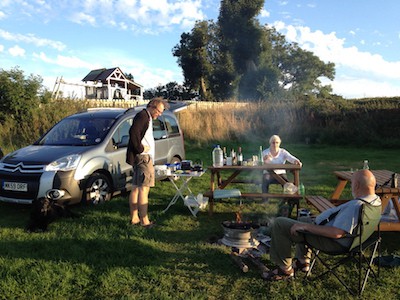
Except in an absolute emergency, you probably won’t want to cook inside the car.
Camping in good weather is easy – you’ll simply use your stove or barbecue outside. In bad weather, it’s a choice between using the protection of a tarp, going to a pub or restaurant to eat or taking a supply of meals that can be prepared using just hot water.
Lots of the stuff sold as camping food is pretty awful, so be warned! Have a look at our recommendations for readymeals that are fast and easy, and actually delicious (plus fairly healthy).
Compact Camping Stoves
You’ll no doubt have your favourite camping stove and kit already. If not, you’ll need to balance the storage space available with the sort of cooking you want to do.
We take a Campingaz Bivouac for fast-boiling a kettle of water or a pan of soup. It’s tiny but super-efficient.
If we have more space, it’s the Cadac Safari Chef
The Cadac Safari Chef gives us lots of cooking options (from a griddle to a wok) but still isn’t too big. Remember that there’s both a low and a high pressure gas version (see the Cadac review for more info).
Fridges and coolboxes
What do you do about keeping milk, butter and other things cool? Camping Fridges, the ideal option is a 12V compressor fridge.
We tested the CDF36. Despite its name, this is actually a 31-litre fridge/freezer that’s high enough to take upright wine bottles and two-litre bottles.
There’s a cold section and a smaller area equivalent to the salad drawer in your home fridge, and even an interior LED light. A pull-out basket makes it easy to transfer things from the fridge to the cooler when you’re packing. Its temperature range is +10 to -15, and, being a compressor, it’ll achieve those temperatures whatever the heat outside.
There are small fridges that are ideal for basics and will fit easily into a car. These aren’t cheap, but they stay at the right temperature even if it’s +30 outside. Coolboxes are OK, but you’ll need to change icepacks constantly and they can be bulky.
Have a look at our guide to choosing a cooler or fridge.
Some campsites, like this one in the South of France, have fridges you can borrow or hire. Alternatively, use small cartons of UHT milk or non-dairy, use olive oil instead of butter and learn to go fridgeless!
Make cooking easy
Taking a lot of provisions with you isn’t easy – partly because you’re limited for space and partly because the more you have, the harder it is to find anything! We tend to buy as we need things, but take a basic kit of herbs and spices, a few tins and other essentials.
Make it easy for yourself. Cook when you can and you want to, but don’t feel it’s cheating to pop into a café or open a packet of Firepot (we’ve used them a few times and they’ve always been like real food!). See other readymeal recommendations too. Remember to keep a bag on the go for rubbish. We do try to recycle when we’re camping. It might mean carrying a few bottles and cans around till you find a recycling spot, but it seems wrong to chuck everything away when pleasant camping depends on caring for the environment.
Where can I camp in my car?
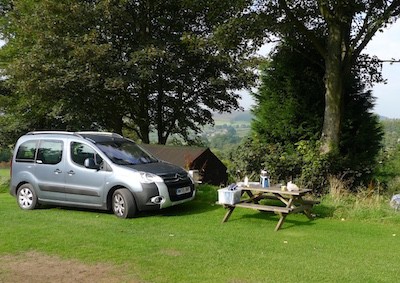
As mentioned above, there are some campsites that don’t allow car or van camping.
Some are especially unhappy if you turn up in a small van with the name of a company on the side. I guess they’re equating small vehicle camping with riff-raff – ie, people they think can’t afford a tent or are a bit too ‘alternative’ to be trusted around immaculate hedges and clean caravans.
Keep quiet!
If you have an awning or utility tent, then there’s no need to tell anyone that you’ll actually be sleeping in the car or van; they’ll just assume the tent is your sleeping area. If that’s a bit too risky for you, then it’s either a question of showing the owner or warden your set-up, so that they can see it’s legit, or moving on to somewhere else.
Don’t be afraid to ask!
We recently spent the night in the (rather picturesque) car park of a farmshop. We checked with the owner, promised to have breakfast in her café and slept well. The same goes for many pubs. We’ve also slept in the forecourts of closed campsites (after checking with the wardens), in remote country parks and hidden away on forestry roads.
Wild Camping
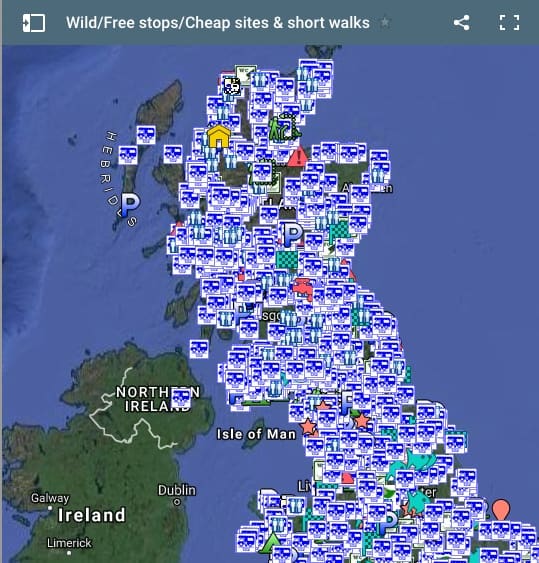
As for wild camping, there are some fantastic apps and websites that help you find places to stay.
Facebook is full of these too, but is also absolutely rubbish when it comes to tracking down information beyond the ‘just-posted’. Everyone asks the same questions, gets recommendations and then they’re lost in the flurry of subsequent posts. The apps and websites in our guide are much easier to use.
As a rule of thumb, you can’t generally wild camp in England or Wales, but you can in Scotland (restrictions in some tourist hotspots like Loch Lomond).
France, Spain and Portugal are super for wild camping. There are restrictions in Scandinavia, the Netherlands and Germany but, in compensation, there are far more places set up for overnight stops or for wild-ish camping.
Don’t push it!
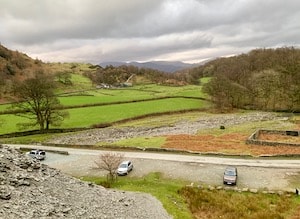
Somewhere wildish in the Lakes.
Car camping is about freedom NOT about taking liberties.
Some people rock up in a car, light a fire in a field, chuck beer cans around and leave used toilet paper in the bushes. This is disgusting and it gives everyone else a bad name.
It also makes it harder and harder for sensible, respectful car campers to find a discreet spot.
Treat everywhere you go with sensitivity, put yourself in the shoes of local people and leave nothing behind.
A Caddy California? What do you think?
For around £30,000, you’ll soon be able to have all that VW California neatness in a small campervan. But is it worth the money?
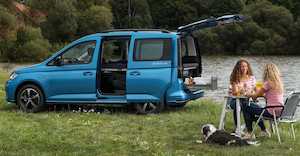
The new California version has the advantage of a big glass roof to liven things up, plus California accoutrements such as built-in table and chairs, blinds on the windows and a neat pull-out kitchen under the tailgate
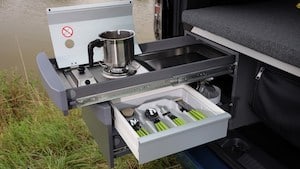
But is it better than a DIY car-camper or a proper campervan?
We did look at the standard Caddy as a possible workaround. What put us off was the low driving position (compared to Transporter-sized) that was aggravated by the rather dark, hearse-like feeling inside.
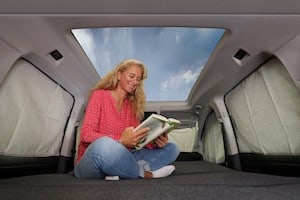
The factory-built campervan version would definitely have tempted us with its brightness, and we can see there being a lot of fans!
Building your own or enjoying the workaround-ness of an ad hoc car camper still tops the options for us.
A few ideas…
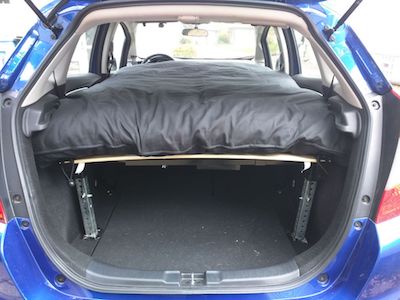
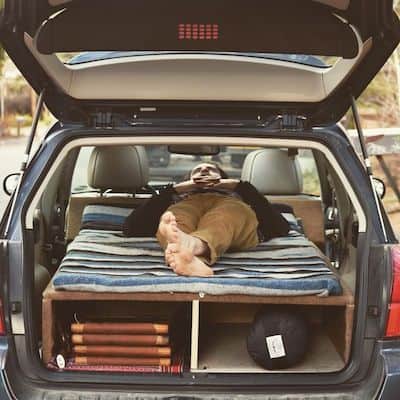
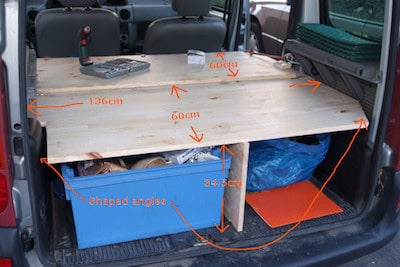
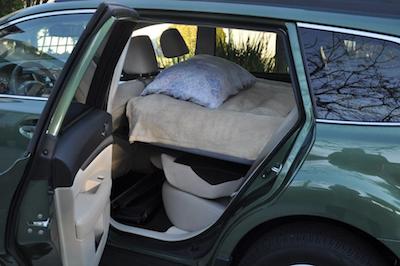
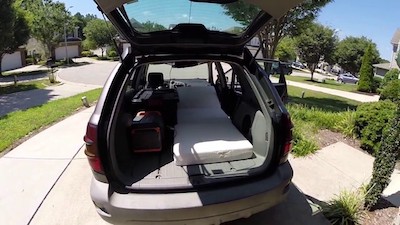
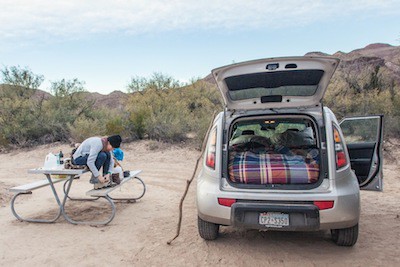
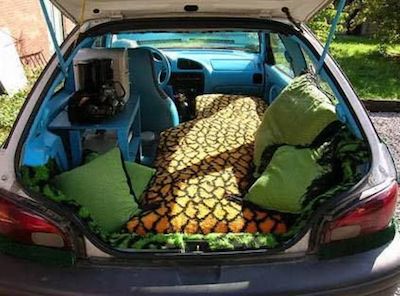
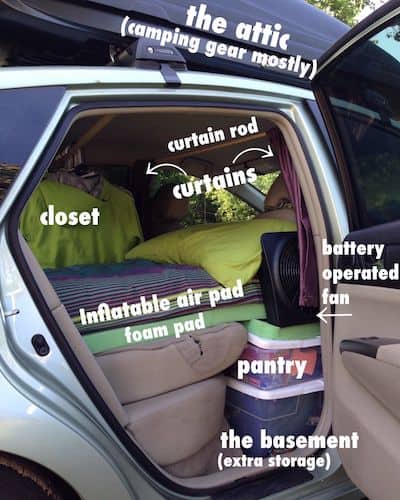
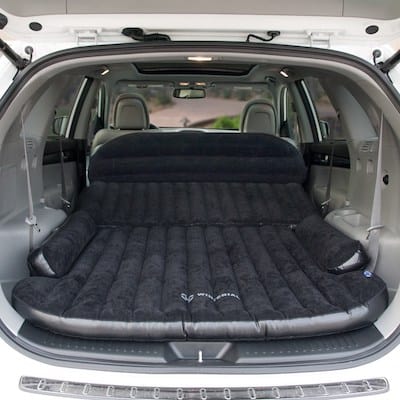
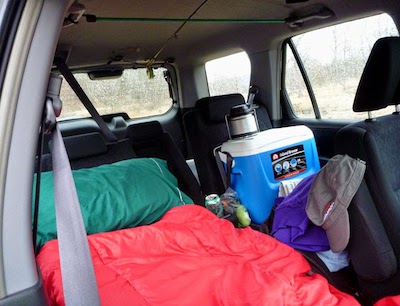
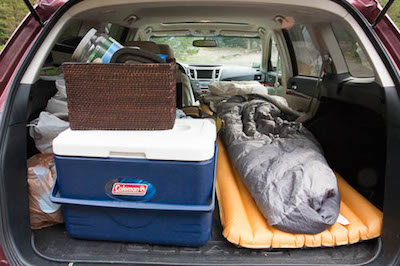
Not convinced? How about a roof-tent or a real campervan?
Which are the best campervans and compact caravans?
Why pull dull? Trailer options
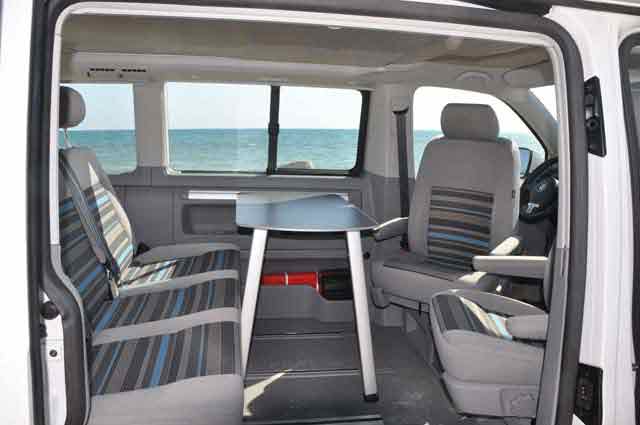
Frequently Asked Questions
Can I sleep in my car at a campsite?
The answer to this question is not always a clear yes. It depends on the campsite and what they prefer. Some will allow you to sleep in your car, others require that tents be set up before dark, other sites don't allow camping at all. If there are no signs or information about sleeping arrangements available for a camp site then it's best to contact them directly with any questions prior to arrival so as not inconvenience yourself unnecessarily should they have an issue with sleeping vehicles overnight.
Is sleeping in a car warmer than a tent?
Sleeping in a car can be warmer than sleeping in an unheated tent. When you sleep, your body temperature decreases by one degree every hour and the colder it is outside, the faster this happens. This means that if you are trying to stay warm while camping outdoors, it's important to keep yourself as insulated from cold air as possible because even five degrees of difference may make all the difference between being comfortable or feeling miserable all night long.







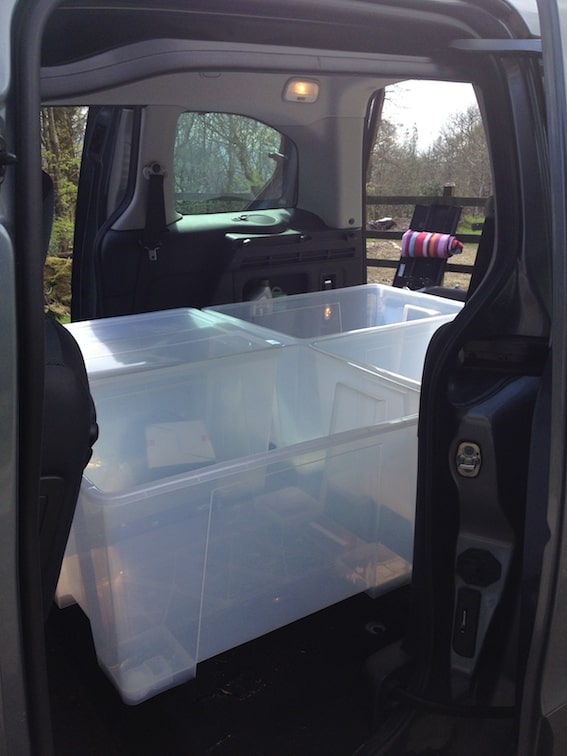
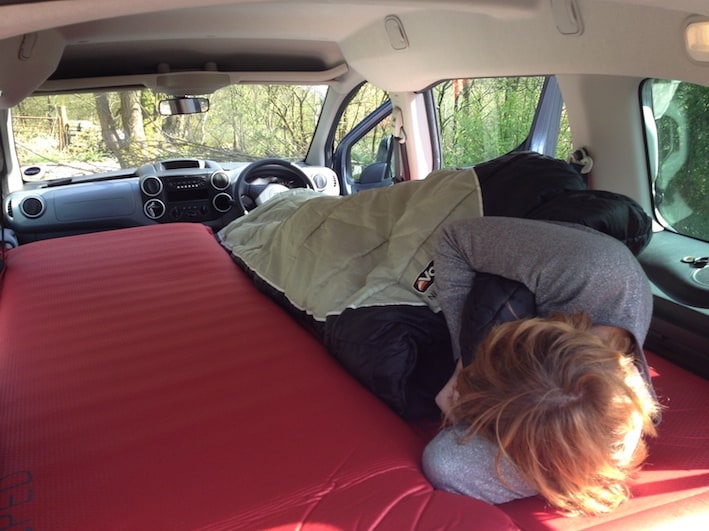



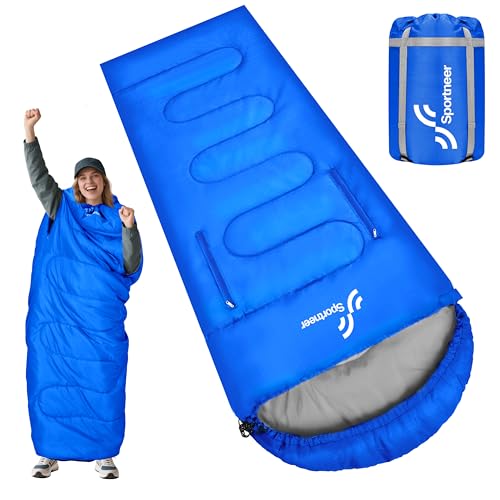





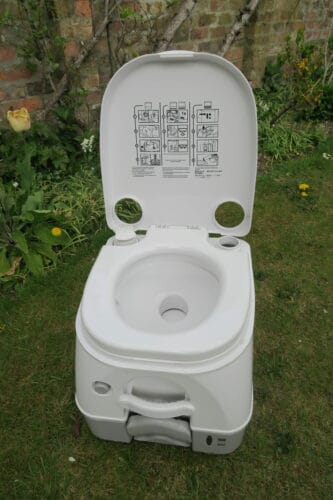


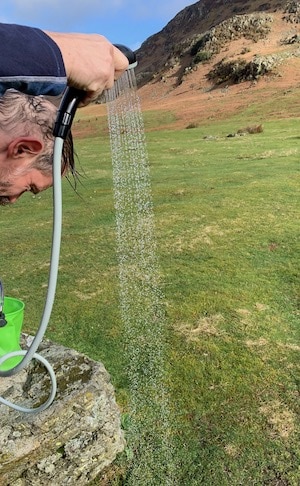









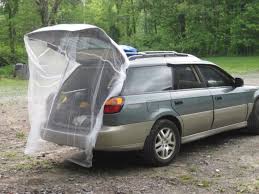






![Big Ant Car Boot Organiser [600D Military-Grade] - 70L XL Capacity Waterproof Trunk Organizer with 8...](https://m.media-amazon.com/images/I/51CIhvcxCuL._SL160_.jpg)


